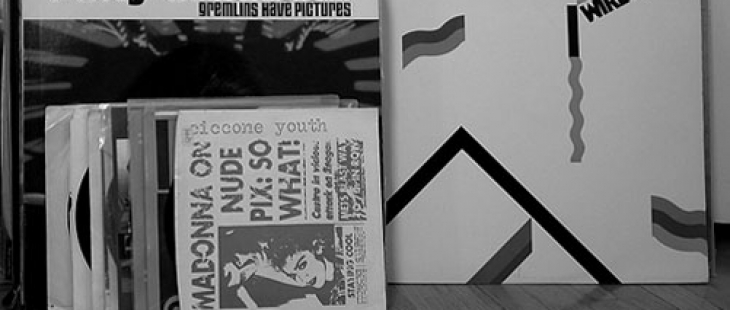
Even in 2011, when the term “iPod” is already starting to gather a kind of quaintness, we are not so far into the future to have forgotten the pleasures of a physical music collection. To visit a friend’s house and feel the worn cardboard fringes of his or her records, or hear the reassuring clickety-clack of music nerds rifling through CDs at Sonic Boom – the nostalgia of the physical still creeps in at the edges of our digital lives.
Yet, the thing with music collections was the space they took up in our lives was as much mental as it was physical. When I was in a three-chord grunge band in high-school (this was simply the done thing in the mid-90s), we played in drummer Kevin’s basement surrounded by walls full of thousands of his father’s CDs and albums. It was, like, symbolic man. We were immersing ourselves in music history in a tangible way, the waves of fuzz-laden guitars bouncing off the plastic covers and, we hoped, picking something up along the way.
Music collections were like libraries of culture and personality. We crafted them to be reflections of ourselves, as over time the slow accumulation shaped us. Yet this sort of obsessive fetishization of the library didn’t simply evaporate with the arrival of digital. Quite to the contrary, we simply took our collector mentality to the tools Lord Jobs gave us. My iTunes is littered with playlists from my past, bearing ridiculous titles like “Bitterly Cold Winter, Late at Night” or “Working on a Sunny Afternoon.”
But then, that was the whole point of a music collection, wasn’t it? Whether digital or physical, that fastidious attention to detail meant you’d not only have the perfect song for the perfect time, you’d also be able to display your mastery of culture. Music was always a synecdoche for the unending ebb and flow of social change – and you, the owner of the collection, presided over it.
Yet even this sense of collecting is now changing. Recently, financial blogger Felix Salmon linked to a study done on media piracy in emerging economies. Amidst the many ramifications for the media business, he pulled a fascinating quote about why the idea of collection is changing:
Among privileged, technically literate consumers, the issue is one of manageable scale: the growing size of personal media libraries is disconnecting recorded media from traditional notions of the collection — and even from strong assumptions of intentionality in its acquisition.
Put another way, there’s just too damn much. The study also adds an interesting statistic: in the average collection of 8000 songs, about two-thirds have never been listened to. Suddenly, our capacity to collect has outstripped our ability to inscribe our identities on and through those collections:
Such numbers describe music and, increasingly, video communities that share content by the tens or hundreds of gigabytes—sizes that diminish consumers’ abilities to organize or even grasp the full extent of their collections… On such scales, many of the classic functions of collecting become impersonal, no longer individually managed or manageable.
Which is to say, the point of collecting has changed. It is not to own or keep music; it is to have it there so one might stumble upon it at some unspecified time in the future.
Sometimes late at night, I’ll sit with headphones on and iTunes on shuffle. Out of the blue, some song I haven’t heard in ages and which used to mean so much to me will pop up, and I’ll almost get choked up. It’s partly emotional surprise, but it’s also the sense of loss. How and when did I forget this track that once meant everything? Each time some unique song gets lost among the mass, it’s a tiny bit heartbreaking.
But there’s a flipside to this. This week, Google announced their new music service, will which keep all your music in “the cloud.” Now, your music collection will be accessible anywhere: through a phone, walking down the street, or even in another country. It’s the collection dematerialized, no longer even on our computers, but simply out there, omnipresent, but invisible and intangible too.
Still, on those same nights, working into the morning with that endless music collection rushing by, shuffle will also bring me a song I’ve never heard before. Far from the feeling that something is slipping away, I suddenly fill up with joy. Here it is, the perfect song for this moment, an instance perhaps never to be repeated. And after it happens a few times, it becomes a thing. Rather than collecting or physically holding on to music, you simply wait for those glorious moments of overlap: where the right song hits at the right time, and everything is great. As if, in the demise of the collection, comes a new way of relating to the ever-changing soundtrack of our lives.














